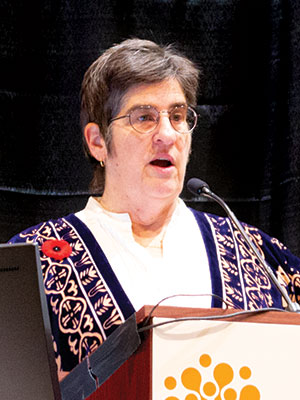
When ARP Past President Marian T. Hannan, DSc, MPH, first joined the association in 1988, she was naïve to the impact it would have on her career. In fact, she said, it took many years for her to recognize the benefits she was receiving through her involvement in ARP.
On Sunday morning, Dr. Hannan, Professor of Medicine at Harvard Medical School, Boston, shared her story as part of her ARP Keynote Address aimed at helping attendees cultivate their leadership skills and develop their careers.
She said she hoped her address, “Paying it Forward: Reciprocal Learning and Sustainable Leadership,” would help ARP members take care of themselves and their careers so they can best take care of others.
“What is reciprocal learning?” she asked. “It’s really just a back-and-forth. It’s a duo… For me, it’s about our capacity to fix the world. How do we make it better? You be my reality check, and I’ll be your reality check. I’ll share my information with you, and you share information with me.”
Dr. Hannan went on to illustrate how ARP provides ideal opportunities for reciprocal learning — even if attendees may not recognize it initially.
“It took me decades to realize that I was a reciprocal learner and a reciprocal tutor,” she said. “You need someone in your network with a commitment to the careers and education of others. That is here in abundance at this meeting and throughout the year. Again, it took me decades to recognize that I was passively gaining all these good things through my involvement at ARP, so I’m here today to bring it into your consciousness.”
When you’re aware of these opportunities for mentorship, information sharing and leadership, you can thoughtfully and mindfully create a plan for career development that moves the world forward, Dr. Hannan said.
Throughout her talk, Dr. Hannan offered lessons she learned — from practical thoughts on collaboration to more existential questions about one’s legacy.
“One thing I’ve learned from my ARP experience is group dynamics,” she said. “Serving on committees, I learned that if only one person has a vision or owns a project, it’s not a collaboration. It’s either hierarchical, and sometimes you don’t get very good results that way, or, at best, it’s educational — one person educating the masses.
“I’ve also learned that I couldn’t get buy-in for a project that’s already carved in stone… Contributions, both the type you expect and the type that come as a surprise, have to be welcomed and weighed by the group, not just by the individual leading the group. For me, this was a hard lesson to learn.”
Understanding these group dynamics is perhaps the most important lesson for career development, Dr. Hannan said.
“Successful careers are grown with cultivation of groups,” she said. “You never see a farmer with one corn plant. Or an orchard with one tree. You see a group. Successful careers are grown with the same cultivation. Where everyone helps and where there’s cross-pollination.
“Creating sustainable leadership starts with us, in our groups. With the mentorship that occurs formally and casually at this meeting and throughout the year. Reciprocal learning happens at just about every interaction. Networks are constantly strengthening and expanding. Particularly at this meeting. We have a responsibility to pay it forward. To fix the world while we grow our careers.”
6 Tips for Career Success
During her keynote address Sunday morning, Dr. Hannan offered six strategies for rheumatology professionals building their careers.
1. Cultivate relationships with senior members of the field as well as peers for social and instrumental support, access to information, and experience.
2. Communicate effectively and with a purpose.
3. Assess your professional networks and develop a strategy to strengthen them.
4. Practice unstructured networking events to improve your comfort with them.
5. Build and sustain diverse networks.
6. Practice reciprocal learning and contribute to groups.
